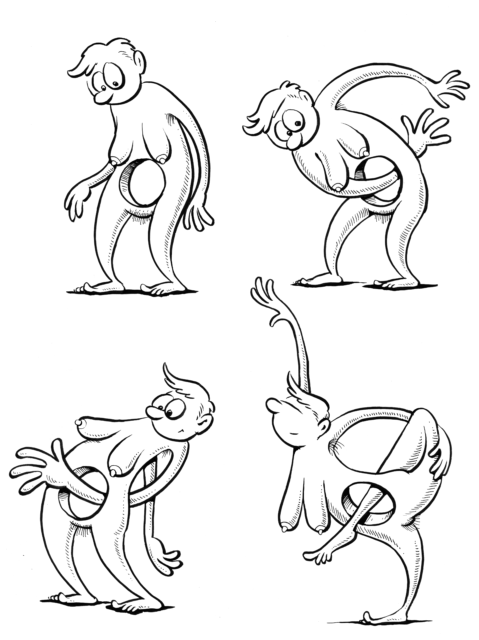I was invited to participate in a “Studio Process” for a graduate student’s thesis project, and here’s what came out of me:
Month: February 2023
COMPLIANCE COMIX!
My new crowdfunder is now live! https://www.indiegogo.com/projects/compliance-comix
The Heterodorx visit Ireland
Corinna and I made a quick trip to Ireland last weekend to visit our friend Alasdair (aka Angus Fox). We laughed, we cried (at the end), we laughed some more, we played Scrabble, we called each other “titface” and “equim.”
Photos after the fold…
Continue reading “The Heterodorx visit Ireland”
He-ing Corinna
Corinna, my friend and podcast co-host, is a man to me. I don’t think it’s because I’ve been using sex-based pronouns for him, as I do for everyone. He does pass; the majority of people read him as female. When I first saw him in a video, I thought, “he passes, he’s cute.” And once I mistook him for a mom, from a distance, while he was unloading his bike parked right next to a dad unloading more bikes with his kids. I read them all as a family unit, didn’t recognize Corinna, and rode right by.
Nonetheless, Corinna is a man to me, and not just on a technicality. Calling him “him” generates for me no cognitive dissonance; I don’t get tripped up as I do with Buck Angel.
Back in the day (circa 2017), when male transactivists liked to claim they were “expanding the bandwidth of womanhood,” gender critical radical feminists responded that such men were expanding the bandwidth of manhood. Why couldn’t we accept that some men are feminine? Men are eager to exclude effeminate men, especially effeminate gay men, from manhood. Meanwhile, unfeminine women, masculine women, were increasingly eager to exclude themselves from womanhood. Radical feminists urged everyone to broaden their acceptance of men and women, to include the full range of behaviors and presentations we call gender.
This seemed sensible to me. I was already opposed to sexist stereotypes, being gender non-conforming myself. But prior to 2017, I believed if an individual wanted to exclude themselves from their sex class, I should support their exclusion. Isn’t that “kind”?
Well, no. It’s not kind to tell someone that they have no place in their natal sex class because they don’t feel like they fit in. Your sex isn’t socially determined. Yes, your social “sex roles” are, but I supported broadening these categories to include everyone. Women can be firefighters and airplane technicians and boxers, strong and active and butch. Men can be pretty and wear dresses and present themselves as objects for consumption, weak and passive and effeminate.
Corinna is a man to me. An effeminate gay man with no gonads, who has been on exogenous estrogen for decades. His fat distribution is more “womanly” than my own. He has long hair; I cut mine short. He is a disenchanted transsexual. Does he want to exclude himself from his sex class? I don’t think so, but other men certainly did in the 1990’s, when he chose irreversible surgery as a teenager.
Corinna is a man attracted to men. He has had relationships with men where both he and they pretended he was a woman. He has told me he doesn’t want to do this again. He knows he is not a woman; he wants to be with a man who accepts him as he is.
Maybe Corinna is a man to me because we’ve had so many conversations about this. Maybe it’s because I really have expanded my idea of manhood and womanhood. Whatever the reason, I now find it jarring when strangers call Corinna “ma’am,” and friends call him “her.” I acknowledge some people sincerely perceive him as female. Others might register ambiguity, but think they know what side of “be kind” they should fall on.
Sometimes I joke that I call Corinna “he” because I’m an asshole. Or because I’m so rigid about using sex-based pronouns. But the fact is, I really, truly, sincerely perceive Corinna as a man, albeit an extraordinary one. Extraordinary men are men, and, extraordinary though he may be, Corinna is no exception.
Apocalypse Animated Lenticular Cards Crowdfunder
I chose this Christian Crowdfunding platform because they claim to not cancel people (unlike this one) and because this particular project should appeal to Christians, as they are the Book of Revelation’s biggest fandom. https://www.givesendgo.com/apocalypseanimated

